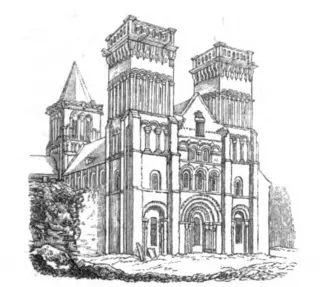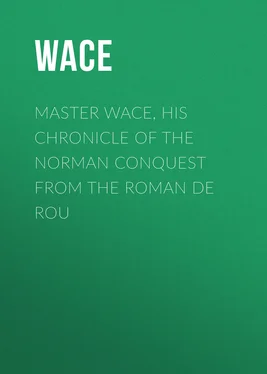Wace - Master Wace, His Chronicle of the Norman Conquest From the Roman De Rou
Здесь есть возможность читать онлайн «Wace - Master Wace, His Chronicle of the Norman Conquest From the Roman De Rou» — ознакомительный отрывок электронной книги совершенно бесплатно, а после прочтения отрывка купить полную версию. В некоторых случаях можно слушать аудио, скачать через торрент в формате fb2 и присутствует краткое содержание. Жанр: foreign_prose, История, foreign_edu, foreign_antique, на английском языке. Описание произведения, (предисловие) а так же отзывы посетителей доступны на портале библиотеки ЛибКат.
- Название:Master Wace, His Chronicle of the Norman Conquest From the Roman De Rou
- Автор:
- Жанр:
- Год:неизвестен
- ISBN:нет данных
- Рейтинг книги:4 / 5. Голосов: 1
-
Избранное:Добавить в избранное
- Отзывы:
-
Ваша оценка:
- 80
- 1
- 2
- 3
- 4
- 5
Master Wace, His Chronicle of the Norman Conquest From the Roman De Rou: краткое содержание, описание и аннотация
Предлагаем к чтению аннотацию, описание, краткое содержание или предисловие (зависит от того, что написал сам автор книги «Master Wace, His Chronicle of the Norman Conquest From the Roman De Rou»). Если вы не нашли необходимую информацию о книге — напишите в комментариях, мы постараемся отыскать её.
Master Wace, His Chronicle of the Norman Conquest From the Roman De Rou — читать онлайн ознакомительный отрывок
Ниже представлен текст книги, разбитый по страницам. Система сохранения места последней прочитанной страницы, позволяет с удобством читать онлайн бесплатно книгу «Master Wace, His Chronicle of the Norman Conquest From the Roman De Rou», без необходимости каждый раз заново искать на чём Вы остановились. Поставьте закладку, и сможете в любой момент перейти на страницу, на которой закончили чтение.
Интервал:
Закладка:
The river and the sea also swept away numbers, the king looking on in sorrow and dismay. From the height of Basteborc, he looked down and saw Varavile and Caborc; he beheld the marshes and the valleys, which lay long and broad before him, the wide stream, and the broken bridge; he gazed upon his numerous troops thus fallen into trouble; some he saw seized and bound, others struggling in the deep waters; and to those who were drowning he could bring no succour, neither could he rescue the prisoners. In sorrow and indignation he groaned and sighed, and could say nothing; all his limbs trembled, and his face burned with rage. Willingly, he cried, would he turn back, and endeavour to find a passage, if his barons would so counsel, but no one would give such advice. "Sire," said they, "you shall not go; you shall return another time and destroy all the land, taking captive all their richest men."
Then the king went back into France, full of rage and heaviness of heart, and never after bore shield or lance; whether as a penance or not I know not. He never again entered Normandy: nor did he live long, but did as all men must do; from dust he came, to dust he returned. At his death he was greatly lamented, and his eldest son Philip 98 98 Philip I. was, at Henry's death, in 1060, an infant of seven years old. Baldwin, count of Flanders, William's father-in-law, was Philip's guardian; having married Henry's sister. Wace calls her Constance, instead of Adela; but Constance was in fact the name of her mother, king Robert's queen. See Chap. VII.
was crowned king in his stead.

CHAPTER VII.
HOW WILLIAM PROSPERED, AND HOW HE WENT TO ENGLAND TO VISIT KING EDWARD; AND WHO GODWIN WAS
The story will be long ere it close, how William became a king, what honour he reached, and who held his lands after him. His acts, his sayings and adventures that we find written, are all worthy to be recounted; but we cannot tell the whole. In his land he set good laws; he maintained justice and peace firmly, wherever he could, for the poor people's sake, and he never loved the knave nor the company of the felon.
By advice of his baronage he took a wife 99 99 The marriage was, it is supposed, in 1053. See the last note to Chapter VI.
of high lineage in Flanders, the daughter of count Baldwin, and the granddaughter of Robert king of France, being the daughter of his daughter Constance. Her name was Mahelt 100 100 Matilda. The anonymous continuer of Wace's Brut says of her; Ceste Malde de Flandres fu née, Meis de Escoce fu appelée, Pur sa mère ke fu espusé Al roi de Escoce ki l'out rové; Laquele jadis, quant fu pucele, Ama un conte d'Engleterre. Brictrich-Mau le oï nomer, Apres le rois ki fu riche ber. A lui la pucele enveia messager Pur sa amur a lui procurer: Meis Brictrich Maude refusa, Dunt ele mult se coruça. Hastivement mer passa E a Willam bastard se maria. He then relates that after the conquest, Matilda revenged herself on this Brictrich-Mau, by seizing him 'a Hanelye, a sun maner,' and carrying him to Winchester, where he died 'par treison.' See, as to this Brictrich, Dugdale, Monasticon , title TEWKESBURY; and Palgrave, English Commonwealth , vol. i. ccxciv.
, related to many a noble man, and very fair and graceful. The count gave her joyfully, with very rich appareillement, and brought her to the castle of Ou 101 101 Eu.
, where the duke espoused her. From thence he took her to Roem, where she was greatly served and honoured.
At Caem the duke built two abbeys, endowing them richly. In the one, which was called SAINT STEPHEN, he placed monks; Mahelt his wife took charge of the other, which is that of THE HOLY TRINITY; she placed nuns there, and was buried in it as she had directed in her life, from the love which she had always used to bear towards it 102 102 The churches of each of these celebrated foundations remain; we shall find William interred in his church; while Matilda's remains rested in the other.
.
And the duke did what, I believe, no one before or after did. He sent 103 103 The 'Truce of God' was introduced in Normandy in 1061. If Wace meant to assert that the institution originated there, it is of course erroneous. It had existed in other countries twenty years before; but the Normans resisted its introduction among them, till enforced by William's authority, as a measure of restraint on their excesses. See Jolimont, Monuments de Calvados , page 42, and plate xx, as to the ruins of the church of St. Paix.
for all his bishops to assemble, with his earls, abbots, and priors, barons and rich vavassors, at Caem, there to hear his commandment; and caused the holy bodies, wherever he could find them, to be brought thither, whether from bishopric or abbey, over which he had seigniory. He had the body of St. Oain 104 104 Saint Ouen.
taken from Roem to Caem in a chest; and when the clergy, and the holy relics, and the barons, of whom there were many, were assembled on the appointed day, he made all swear on the relics to hold peace and maintain it from sunset on Wednesday to sunrise on Monday. This was called THE TRUCE, and the like of it I believe is not in any country. If any man should beat another meantime, or do him any mischief, or take any of his goods, he was to be excommunicated, and amerced nine livres to the bishop. This the duke established, and swore aloud to observe, and all the barons did the same; they swore to keep the peace and maintain the truce faithfully.
To commemorate this peace through all time, that it might endure for ever, they forthwith built a minster of hewed stone 105 105 Carreau, or carrel—squared, quadrated, or quarried stones, for which the neighbourhood of Caen became celebrated.
and mortar, on the spot where they swore upon the relics which had been brought to the council. Many who had assisted at founding the minster called it Toz-sainz 106 106 All-Saints.
, on account of so many holy relics having been there; but it pleased many men to call it Sainte-paiz, on account of the peace sworn to when it was built: at least I have heard it called both Sainte-paiz and Toz-sainz. Close by they built a chapel called Saint-Oain's, on the spot where his bones had rested while the council sat.
William was generous, and the strangers who knew him, cherished him much. He was very gentle and courteous, therefore king Edward loved him well; great indeed was their love, each holding the other his lord. The duke went to see Edward and know his mind; and having crossed over into England 107 107 This journey took place in 1051, during the exile of Godwin and his sons; see Higden, Polychronicon . Most of the old historians are silent about it; but it admits of little question, and had important influence on subsequent events. See Thierry , i. 220.
, Edward received him with great honour, and gave him many dogs and birds, and whatever other good and fair gifts he could find, that became a man of high degree. He did not tarry long, but returned into Normandy; for he was engaged with the Bretons, who were at that time disturbing him.
Godwin had great wealth in England; he was rich in lands, and carried himself proudly. Edward had his daughter to wife; but Godwin was fell and false, and brought many evils on the land; and Edward feared and hated him on account of his brother whom he had betrayed, and of the Normans whom he had decimated, and many other mischiefs plotted by him. And thus, both in words and deeds, great discord arose between them, which was never thoroughly healed. Edward feared Godwin much, and banished him from the land; swearing that he should never come back, or abide in his kingdom, unless he swore fealty to him, and delivered him hostages, and pledges for keeping the peace during his life. Godwin dared not refuse, and as well to satisfy the king, as for the sake of his relations, and the protection of his men, he delivered one of his nephews and one of his sons 108 108 In 1052.
as hostages to the king. Edward sent them to Duke William in Normandy, as to one in whom he placed great trust, and desired him to keep them safe till he should himself demand them. This looked, people said, as if he wished William always to keep them, for the purpose of securing the kingdom to himself in case of Edward's death. On these terms the king suffered Godwin to remain at home in peace. I do not know how long this lasted, but I know that Godwin in the end choked himself, while eating at the king's table during a feast.
Интервал:
Закладка:
Похожие книги на «Master Wace, His Chronicle of the Norman Conquest From the Roman De Rou»
Представляем Вашему вниманию похожие книги на «Master Wace, His Chronicle of the Norman Conquest From the Roman De Rou» списком для выбора. Мы отобрали схожую по названию и смыслу литературу в надежде предоставить читателям больше вариантов отыскать новые, интересные, ещё непрочитанные произведения.
Обсуждение, отзывы о книге «Master Wace, His Chronicle of the Norman Conquest From the Roman De Rou» и просто собственные мнения читателей. Оставьте ваши комментарии, напишите, что Вы думаете о произведении, его смысле или главных героях. Укажите что конкретно понравилось, а что нет, и почему Вы так считаете.












